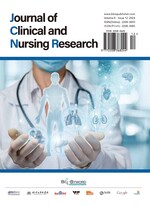Abstract
Objective: To explore the impact of a continuity of care model on negative emotions and self-efficacy in patients undergoing digestive endoscopic tumor resection. Methods: A retrospective analysis was conducted on 80 patients who underwent digestive endoscopic tumor resection in the Gastroenterology Department of Baoying County People’s Hospital between October 2022 and October 2024. Patients were randomly divided into a control group (n = 40) and an observation group (n = 40) using a random number table. The control group received routine nursing care, while the observation group was additionally provided with continuity of care interventions. After two months of intervention, the negative emotions and self-efficacy of the two groups were compared and statistically analyzed. Results: There was no statistically significant difference in baseline data between the two groups (P > 0.05). After two months of intervention, the observation group demonstrated significantly lower HAMD and HAMA scores compared to the control group (both P = 0.000), and significantly higher GSES scores (P = 0.000). Conclusion: Applying a continuity of care model to patients undergoing digestive endoscopic tumor resection can alleviate negative emotions, enhance self-efficacy, and improve self-care abilities.
References
Su HG, 2022, Efficacy and Safety of Endoscopic Submucosal Dissection in the Treatment of Early Gastric Cancer. Clin Med, 42(2): 27–29.
Zhao QX, Liu LY, Zhang XJ, 2021, Effect of Continuity of Care on Chemotherapy Compliance and Negative Emotions in Postoperative Breast Cancer Patients. Med Theor Pract, 34(7): 1245–1247.
Feng Y, 2019, Effect of Continuity of Care Health Education Model on Postoperative Recovery of Gastric Cancer Patients. Gen Pract Nurs, 17(24): 3074–3076.
Huang L, Wang DM, Gao D, et al., 2023, Clinical Effect Analysis of Postoperative Continuity of Care for Gastric Cancer in the Context of “Internet Plus.” Prim Med Forum, 27(18): 33–36.
Ding X, Chen X, Li H, et al., 2022, Application Value of Continuity of Care Intervention in Postoperative Recovery of Digestive Tract Tumor Patients. J Dig Tumors (Electronic Edition), 14(2): 204–208.
Chen LX, Huang CY, Zhu J, et al., 2021, Effect of Follow-Up-Based Continuity of Care Model on Preventing Upper Limb Lymphedema in Postoperative Breast Cancer Patients. Famous Doctors, 2021(15): 93–94.
Gao Y, 2022, Impact of Continuity of Care Intervention on Self-Care Ability and Quality of Life in Postoperative Patients with Gynecological Malignancies. J Hebei North Univ Nat Sci Ed, 38(2): 23–24 + 27.
Zhong R, Yu ZM, Hu BJ, 2020, Analysis of the Impact of Continuity of Care Health Education on Quality of Life and SDS Scores in Postoperative Gastric Cancer Patients. Smart Health, 6(9): 50–51.
Liu R, Yang XL, 2023, Nursing Effect of Information-Based Continuity of Care Intervention in Postoperative Rectal Cancer Patients with Colostomy. Chin Foreign Med, 42(18): 173–177.
Huang L, Wang DM, Gao D, et al., 2023, Clinical Effect Analysis of Postoperative Continuity of Care for Gastric Cancer in the Context of “Internet Plus.” Prim Med Forum, 27(18): 33–36.
Lin DM, Yuan XH, Chen RQ, 2018, Effect of Continuity of Care on Postoperative Recovery of Gastric Cancer Patients. Pract Clin Nurs Electron J, 3(38): 99–100.
Fu YW, 2022, Impact of Continuity of Care on Self-Care Ability and Quality of Life in Postoperative Liver Cancer Patients. Inner Mongolia Med J, 54(2): 250–251 + 254.
